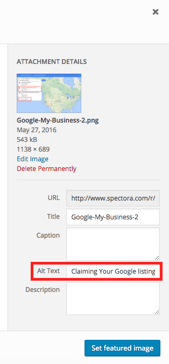How to Properly Optimize Your Home Inspection Site - A Basic Guide


It's tough to know where to start when working on home inspector SEO basics for your site. Oftentimes it's easier to do nothing.
The goal of this guide is to give home inspectors a checklist of places on your site to make sure you're giving Google the right signals.
Many of these are quick fixes that should only take you or your developer a few minutes to implement.
Let's get started!
Plain and simple, search engines crawl the text on your site. That text helps them establish if your site is relevant, authoritative & trust-worthy enough to show when someone searches for a home inspector in [your city].
Don't leave search engines uncertain about which areas you serve (this should not be every city in your state - realistically you will rank for the cities near and around where your business is located).
You want to make sure to add your main target cities, plus the words "home inspector' or "home inspection" in all the following places:
Your unique value proposition (UVP) on your home page can be a good place to include your target cities and keywords. You should also naturally mention these when writing your content for each page.
Remember to strike a balance between writing naturally for your users, but also making sure to sprinkle in that you provide top-notch home inspection services in your target areas.
If it's your radon or mold testing pages, make sure to use those keywords on page as well as in the sections mentioned below.
Each section of content with more than 1 paragraph should have a bold header to break it up. This is a best practice from a reader/usability standpoint and also for SEO.
With so many distractions and noise in the online world, most visitors scan most pages. Be explicitly clear as to what the next paragraph is about.
If you are talking about your licenses & certifications, make the header:
If it's about Radon:
*Be careful not to overdo it as this can be a turn off for customers and search engines.
When you have a tab open in any browser, hover your mouse over the tab. That's the page's title tag.
This is one of the first things Google sees when crawling a page. It's still very important and a common mistake to leave blank or default to the page name.
It's also what shows in organic search results, so it must be written well for the human eye, while still telling Google where you do home inspections.

The second example does a good job of including the main keyword that people search for (Home Inspection Services) with the main city/state they target, and finish with their brand name. Perfect.
This is basically a title tag for images.
For Wordpress users, you'll see this field when you upload an image to your site. Most popular site editor's will have this same field.

Without keyword stuffing, you want to put in something similar to what you would in your H1/Title tag without repeating exactly.
If your site is custom coded, then you would add alt="seattle wa home inspector" at the end of the image tag. Your developer should know how to do this.
This is only if you're creating a new site or new pages. Something like www.yourinspectionbusiness.com/radon-testing/ works just fine here.
It's not recommended to change URLs just for the sake of including keywords. You could do more harm than good here.
We often talk about how important your Name, Address, & Phone Number are in terms of citations & third party sites, but it's equally important on your site.
This is another small strategy that I see missing from many home inspector's sites.
Simply add your NAP to the footer, as that will get crawled with every page by Google. Remember, this should be the exact same format and wording that you use on business listings and local citations. This helps with your local SEO as well.
While these on-page changes are very important for giving Google information about your business, keep in mind that this alone won't boost you to the top of the rankings. Having keywords and your address on your site won't do you much good if:
These are SEO best practices that should be a part of your overall strategy to improve & grow your business.
More and more inspectors are paying attention to the basics now, so the bar has been raised. Nailing these basics, along with a solid content and link strategy will put you above the competition.